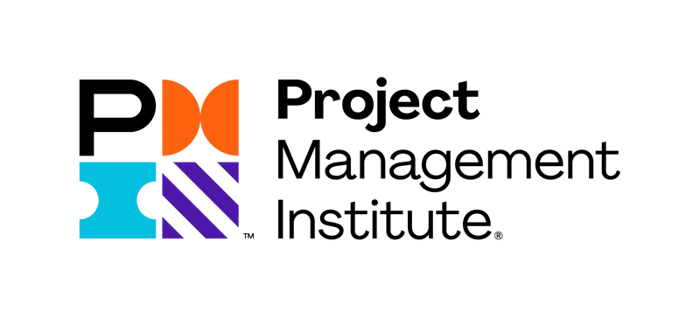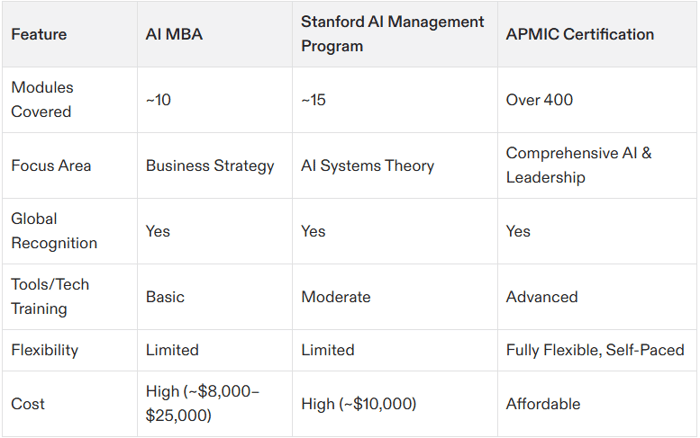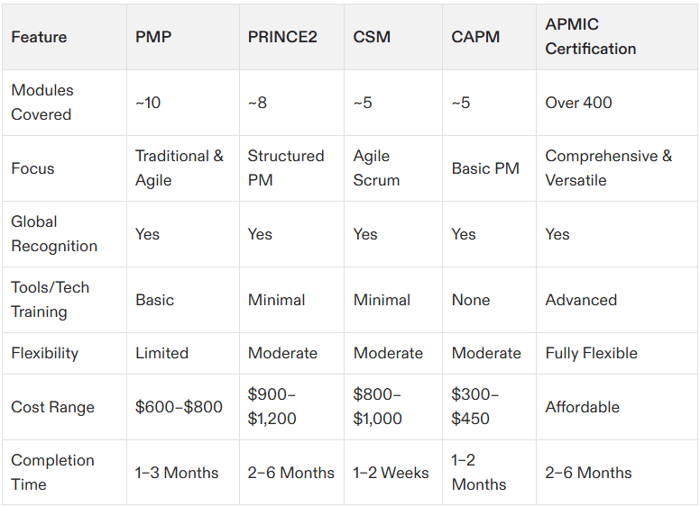Introduction – Why Did the Project Manager Cross the Road?
To deliver the project on time and within budget, of course! But jokes aside, if you’re here, you’re probably looking to boost your project management career. You want better job prospects, higher salaries, and industry recognition. Enter PMI Project Management Certification—your golden ticket to credibility, efficiency, and success in managing projects like a pro.
Whether you're a seasoned project manager or a newbie stepping into the world of project management, earning a PMI certification in 2025 is one of the smartest investments you can make. In this ultimate guide, we'll break down everything you need to know—certifications, benefits, costs, and even the most effective strategies to pass the exam.
And if you’re wondering whether PMI is the only option, we’ll introduce you to an industry-specific alternative certification that might just be a better fit for you!
Why PMI Project Management Certification in 2025?
With the project management industry expected to grow by 33% by 2030, professionals with recognized credentials will be in high demand. PMI certifications provide a standardized approach, making you a global asset in industries like IT, healthcare, construction, and finance.
Key Benefits of PMI Certification:
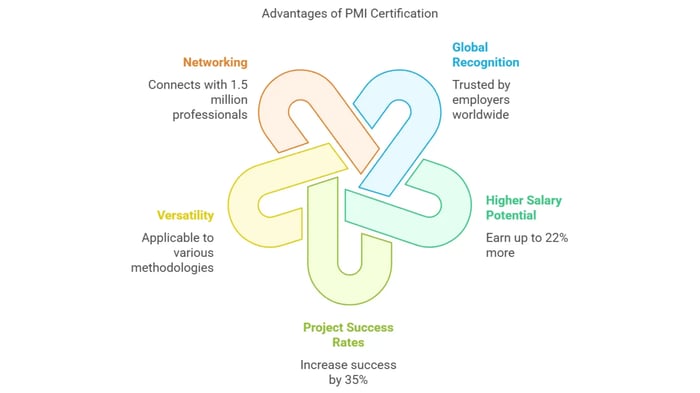
Global Recognition: Employers worldwide trust PMI-certified professionals.
Higher Salary Potential: PMPs earn up to 22% more than non-certified peers.
Project Success Rates: PMI-certified managers increase project success rates by 35%.
Versatility: Works for Agile, hybrid, and traditional project management methodologies.
Networking: PMI connects you with over 1.5 million certified professionals worldwide.
Fact: According to PMI’s Pulse of the Profession 2024 report, businesses that invest in certified project managers waste 30% less money on failed projects.
Pro Tip: If you're curious about how much it costs to get certified, check out our detailed breakdown of PMI certification cost.
The Top PMI Project Management Certifications & Their Requirements
Choosing the right PMI project management certification depends on your career level, industry, and experience. PMI offers multiple certification paths catering to both beginners and seasoned project managers. These certifications are designed to validate your skills in project execution, risk management, Agile frameworks, and strategic leadership.
Whether you’re managing IT projects, overseeing construction developments, or handling corporate initiatives, PMI certifications provide a globally recognized benchmark for professional excellence. Below, we’ll explore the top certifications, their requirements, and the industries they best align with.
1. Project Management Professional (PMP) – The King of PM Certifications
Eligibility:
A four-year degree + 36 months of experience + 35 hours of PM training
OR a high school diploma + 60 months of experience + 35 hours of PM training
Exam: 180 questions (4 hours)
Best For: Mid-to-senior level professionals managing complex projects
2. Certified Associate in Project Management (CAPM) – Best for Beginners
Eligibility: High school diploma + 23 hours of project management education
Exam: 150 multiple-choice questions
Best For: Entry-level professionals
3. PMI Agile Certified Practitioner (PMI-ACP) – The Agile Revolution
Eligibility: 21 hours of Agile training + 12 months of project experience
Exam: Covers Agile, Scrum, Lean, and Kanban methodologies
Best For: IT, software development, and fast-paced industries
For a deeper understanding of Agile methodologies and their impact on project management, explore our PMI Agile certification guide.
4. PMI Risk Management Professional (PMI-RMP) – Managing the Unknown
Eligibility: Risk management experience required
Best For: Those working in finance, compliance, and security
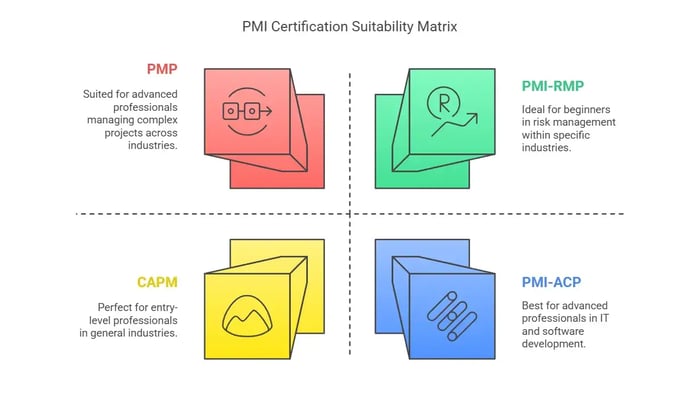
Bonus Read: Download the PMI Certification Handbook – A detailed guide covering eligibility, exam details, and study tips.
How to Pass PMI Project Management Certification Exams in 2025 – Pro Strategies
Earning a PMI project management certification isn’t just about reading textbooks; it requires strategic preparation, practice, and real-world application. The exams are known for their complexity, often featuring scenario-based questions that test not just your knowledge but your ability to apply it effectively. Many candidates find that structured study plans, mock exams, and PMI-approved courses drastically improve their success rates. Here, we’ll outline some of the best strategies to prepare effectively and increase your chances of passing on the first attempt.
1. Follow the PMBOK Guide
The Project Management Body of Knowledge (PMBOK Guide) is your bible. Expect 50% of your PMP exam questions to be based on it.
2. Take PMI-Approved Training Courses
PMI’s Authorized Training Partners (ATPs) offer structured learning paths, ensuring you focus on exam-relevant topics.
3. Join PMI Study Groups & Communities
Networking with fellow candidates boosts exam success rates by 40%!
4. Use Exam Simulators
Mock exams help you understand the format and manage time effectively.
5. Apply Real-World Project Experience
Use your work experience to connect theoretical concepts with practical application.
Which PMI Certification is Right for You? (Self-Assessment Guide)
Choosing the right PMI certification depends on your experience level, career goals, and industry. Here’s a quick self-assessment to help you decide:
Beginner (0-2 years of experience in project management)
- Best certification: Certified Associate in Project Management (CAPM)
- Why? No prior project management experience is required, just 23 hours of PM education.
- Who should consider this? College graduates, career changers, entry-level professionals.
- Exam difficulty: Moderate, mostly theoretical knowledge.
Mid-Level Professional (2-5 years of experience)
- Best certification: Project Management Professional (PMP)
- Why? The gold standard for PM certification, recognized globally.
- Who should consider this? Project coordinators, team leads, managers, consultants.
- Exam difficulty: High—scenario-based and real-world application questions.
Agile Enthusiast (Any experience level, working in Agile environments)
- Best certification: PMI Agile Certified Practitioner (PMI-ACP)
- Why? Focuses on Agile, Scrum, Lean, and Kanban methodologies.
- Who should consider this? IT professionals, software developers, Agile coaches, product managers.
- Exam difficulty: Moderate—covers multiple Agile frameworks.
Risk Management & Compliance Experts (3+ years of experience in risk-focused roles)
- Best certification: PMI Risk Management Professional (PMI-RMP)
- Why? Specializes in risk identification, assessment, and mitigation.
- Who should consider this? Finance professionals, security analysts, compliance officers.
- Exam difficulty: High—requires risk management expertise.
Business Analysts & Strategic Planners (3+ years in analysis roles)
- Best certification: PMI Professional in Business Analysis (PMI-PBA)
- Why? Covers business analysis, requirements gathering, and stakeholder management.
- Who should consider this? Business analysts, consultants, product owners.
- Exam difficulty: High—focuses on strategy and process improvement.
💡 Pro Tip: If you’re not sure which certification fits you best, start with CAPM or PMI-ACP and progress to PMP later.
How Much Does PMI Certification Cost in 2025? (Cost Breakdown & Budgeting Tips)
One of the biggest concerns professionals have before pursuing PMI certification is the cost. Here’s a complete breakdown:
Exam Fees (2025 Pricing)
| PMI Certification | PMI Member Price | Non-Member Price |
|---|---|---|
| PMP | $405 | $555 |
| CAPM | $225 | $300 |
| PMI-ACP | $435 | $495 |
| PMI-RMP | $520 | $670 |
| PMI-PBA | $405 | $555 |
💡 Tip: A PMI membership ($139 per year) offers discounts on exams, training resources, and networking events.
Additional Costs to Consider
- Study Materials & Training ($200-$2,000) – Includes online courses, books, and practice exams.
- Exam Retake Fees (If you fail) – PMP retake costs $275 (PMI members) or $375 (non-members).
- Renewal Fees – PMP, PMI-ACP, and PMI-RMP require renewal every 3 years with Professional Development Units (PDUs).
💡 Budget-Saving Strategies:
- Check if your employer reimburses PMI certification fees.
- Look for PMI study groups that offer free study materials.
- Use free PMI webinars and online resources for self-study.
10 Lesser-Known Facts About PMI Project Management Certifications
🚀 Did you know? These surprising facts about PMI certifications will change how you see them:
1️⃣ PMP exam questions are 40% situational, testing real-world application skills.
📌 Source: PMI PMP Exam Content Outline
2️⃣ PMI certifications uphold strict ethical standards to maintain credibility.
📌 Source: PMI Code of Ethics and Professional Conduct
3️⃣ PMI exams are available in 14 languages, making them accessible globally.
📌 Source: PMI Exam Language Aids
4️⃣ A PMI Digital Badge allows employers to verify your certification instantly.
📌 Source: PMI Digital Badge via Credly
5️⃣ The PMI-PBA (Professional in Business Analysis) is ideal for strategists and analysts.
📌 Source: PMI-PBA Certification Details
6️⃣ PMI offers discounts for veterans and military personnel.
📌 Source: PMI Military & Veterans Program
7️⃣ You can reschedule your PMI exams twice for free.
📌 Source: PMI Exam Rescheduling Policy
8️⃣ PMI-certified professionals get promoted 30% faster than non-certified peers.
📌 Source: PMI Pulse of the Profession 2024 Report
9️⃣ PMI-RMP holders reduce project risks by an average of 20%.
📌 Source: PMI Risk Management Professional (PMI-RMP) Details
🔟 Renewing your PMP requires earning 60 PDUs every three years.
📌 Source: How to Maintain
Final Thoughts – The Best Project Management Certification for 2025
If you’re serious about advancing your career, a PMI certification is one of the most valuable assets you can acquire. However, if you’re in healthcare or IT, you might want to explore a better alternative—the APMIC Certification. With industry-focused modules, APMIC provides real-world application and sector-specific training that traditional PMI certifications don’t cover.
So, are you ready to level up? Choose your certification wisely, and start your journey today!
FAQs – PMI Project Management Certification
Q1. Is PMI certification worth it?
Yes! PMI-certified professionals earn significantly higher salaries and enjoy better job security.
Q2. How long does it take to get PMP certified?
Typically 3-6 months, depending on your study schedule.
Q3. Can I get a PMI certification without experience?
Yes! CAPM certification has no experience requirements.
Q4. What’s the hardest part of the PMP exam?
Scenario-based questions that test application of knowledge.
Q5. Are PMI exams open-book?
No, they are closed-book and require extensive preparation.
Q6. How often do I need to renew my PMI certification?
Every three years, requiring 60 Professional Development Units (PDUs).
Q7. What’s the best PMI certification for IT professionals?
PMI-ACP, as it focuses on Agile methodologies used in tech.
Q8. What’s the best alternative to PMI certifications?
APMIC Certification—tailored for healthcare & IT professionals.

